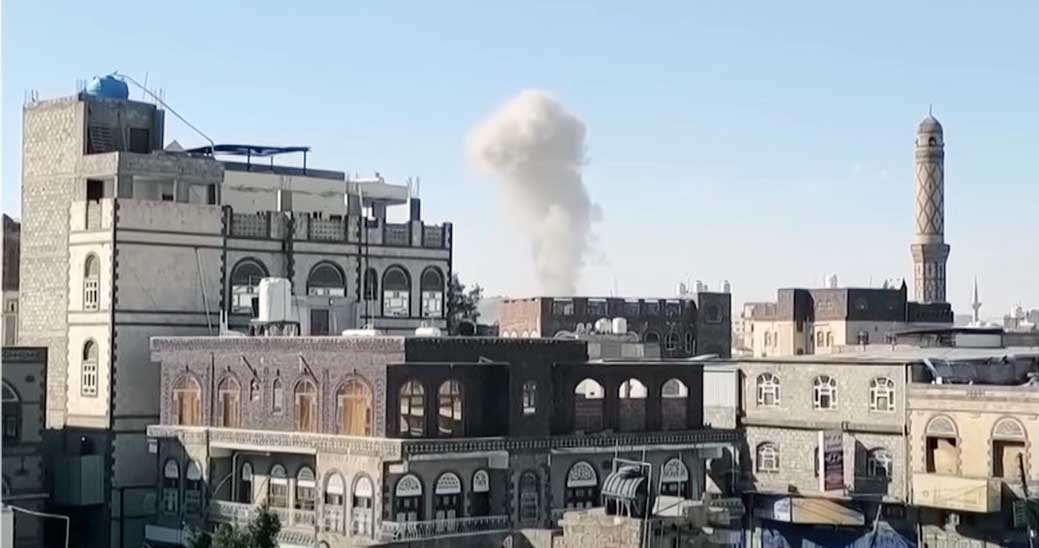December 31, 2024
As Yemen’s Houthi rebels, stubborn in the face of recent U.S. airstrikes, pledge to respond and defend their sovereignty, the geopolitical tension in the Middle East is rising. This evolution emphasizes the intricacy of the continuous fight involving regional powers and international players.
Details of the U.S. Airstrikes
Targeting areas under Houthi control in Yemen, the United States started a sequence of airstrikes on December 30 and 31, 2024. Important sites visited included:
- The capital, Sana’a: Strategic communication hubs and military command centers were reportedly destroyed.
- Coastal regions of Hodeidah: Areas critical for maritime operations, including missile-launching sites and supply depots, were targeted.
The Pentagon stated that the strikes targeted to neutralize the Houthis’ capacity to harm commercial shipping in the Red Sea, which has faced heightened threats due to missile and drone attacks. A statement from U.S. Central Command stressed the need to secure important international maritime channels and maintain stability in the region.
Houthi Defiance and Retaliation Plans
In reaction, Mohammed Abdulsalam, a Houthi spokesperson, criticized the strikes, alleging that they violated Yemen’s sovereignty. “These acts of aggression will not deter us,” he stated in a televised message. “Yemen will continue its struggle for freedom and justice.”
The Houthis have also upped their missile and drone attacks on Israel, showcasing their long-range strike capability. These efforts coincide with their professed sympathy for Palestinians amid the Gaza crisis. Recent missile strikes targeting Eilat and critical maritime channels near the Bab-el-Mandeb Strait have caused significant disruptions.
Regional Impacts of the Escalation
Maritime Security Threats
The Houthis’ tactics have exacerbated fears among multinational shipping corporations. The Red Sea, a crucial waterway for world trade, has witnessed heightened naval patrols by partner forces. Analysts fear that prolonged instability might boost shipping insurance prices and postpone deliveries worldwide.
Humanitarian Crisis
The continued military activities deepen Yemen’s humanitarian challenges. Over 20 million Yemenis today rely on humanitarian help, with food insecurity reaching worrisome proportions. The recent bombings have displaced many, aggravating living conditions in already overcrowded camps. Local NGOs indicate that hospitals in Sana’a and Hodeidah are overcrowded, straining to treat people injured in the attacks.

International Concerns
International observers, notably the United Nations, have called for moderation. A UN spokeswoman stressed that prolonged aggression risks triggering a bigger regional war. Iran’s backing of the Houthis and U.S. involvement could lure in other states, deepening the battle.
Broader Implications
Impact on Global Oil and Trade
The Bab-el-Mandeb Strait, a crucial maritime chokepoint for oil and cargo, is increasingly dangerous. Disruptions here might have ripple effects on global oil prices and trade logistics, with import-dependent economies like the U.S. and European countries bracing for potential economic ramifications.
Geopolitical Tensions
The U.S. airstrikes show a broader commitment to fighting Iranian influence in the region. Iran’s support for the Houthis has strengthened their ability to mount sophisticated attacks, including the deployment of ballistic missiles and drones. Meanwhile, Israel maintains its campaign to minimize Houthi threats, adding another layer of complication to regional politics.
Voices from the Ground
Ahmed al-Sabri, a Yemeni resident from Hodeidah, described his experience: “We live in constant fear. The bombings devastated homes, but the Houthis’ retaliatory activities make matters worse. We are trapped in the middle.”
An anonymous U.S. defense official acknowledged the human toll but underscored the importance of action. “The Houthis have left us no choice. Their aggression in the Red Sea endangers global stability.”
Calls for a Path to Peace
Amid the intensifying violence, demands for diplomacy are growing. The UN has urged all parties to return to the negotiating table, underlining the need for a comprehensive peace accord that resolves Yemen’s internal strife and external meddling.
Conclusion
Yemen remains a flashpoint in the Middle East, with the Houthis’ resistance following U.S. airstrikes showing the persistent volatility. As regional powers and global players negotiate this dilemma, the necessity for diplomatic solutions becomes increasingly critical.
Sources
- Reuters: “Yemen will continue to defend itself, say Houthis after US strikes” (Reuters)
- Associated Press: “Israel struggles to deter escalating attacks from Yemen’s Houthi rebels” (AP News)
- The Guardian: “Tensions rise as Yemen’s Houthis escalate Red Sea threats” (The Guardian)

